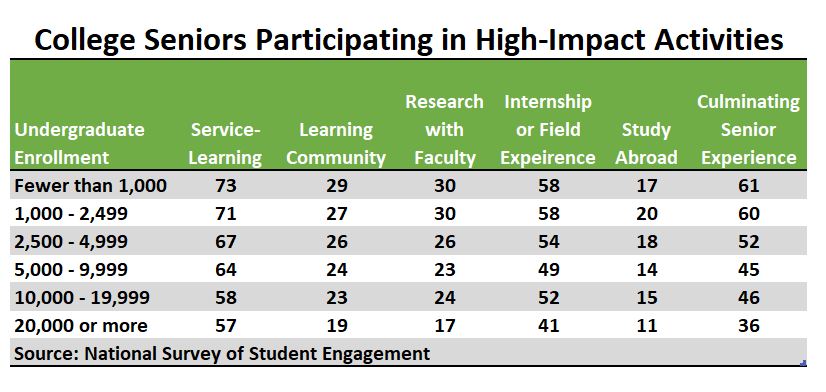 The argument over which is better, large universities or small colleges, is essentially the big fish in a small pond or little fish in a big pond debate. Ultimately, the fish is the same size, it’s more a matter of where the fish will thrive. Having already discussed the advantages of a large university, I think it’s only fair to go over the reasons to choose a small college. Of course, there are disadvantages just as there are for large colleges. I’m not going to cover them here since the point is to focus on the advantages of a small college.
The argument over which is better, large universities or small colleges, is essentially the big fish in a small pond or little fish in a big pond debate. Ultimately, the fish is the same size, it’s more a matter of where the fish will thrive. Having already discussed the advantages of a large university, I think it’s only fair to go over the reasons to choose a small college. Of course, there are disadvantages just as there are for large colleges. I’m not going to cover them here since the point is to focus on the advantages of a small college.
Join other parents in the Coffee Cup College Planning Facebook Group
The Personal Touch
Attending a small college means you’re likely to never have a class with more than 50 students or worry if there will be enough students to “make” the class. You can ask the professors questions in class instead of during office hours or just maybe during one of the several times you’ll run into them on campus. And while not always appreciated, the student can expect the professors to be asking them questions in class as well.
Students who end up taking multiple classes with each other during the year, develop a strong sense of community, and can find it easier to make friends. Faculty will actually recognize students who have taken more than one of their classes and can provide personal guidance and feedback. Students at small colleges can usually pick from multiple professors for recommendations and support in whatever they choose to do after they graduate.
Less Competition
Some of the overlooked benefits of small colleges can be found outside the classroom. There’s less competition for leadership positions in the various student organizations. There are more opportunities to start new organizations since not as many exist to begin with.
This applies to sports as well. At many small colleges, up to a third of the students on campus will also be athletes. Furthermore, since small colleges generally, not always, don’t offer athletic scholarships, they often offer more varsity sports than larger schools.
At most small colleges, students also don’t have to compete with graduate students for research opportunities or even assistantship positions. Students work directly with the professor on research projects rather than under graduate student supervision. And if a school doesn’t offer research in a specific area, they can find ways to accommodate students. Lawrence University actually pairs students with alumni scientists at other universities.
Perhaps most importantly, there is less competition for merit aid. This occurs on a more macro level. The reality is that the majority of colleges in the country are small. However, most students prefer larger schools. Therefore, smaller colleges are more likely to offer merit scholarships to entice students to enroll on their campuses.
Custom Learning Opportunities
Since the number of courses can be limited, faculty encourage students to do independent study classes to pursue their areas of interest beyond what is listed in the course catalog. Just because something isn’t listed doesn’t mean it can’t be studied, including at “graduate” levels. My son was part of a seminar organized by a friend that consisted of four students and two professors to study Clausewitz.
Customized majors are common. Smaller colleges tend to make it easier for students to combine majors or create interdisciplinary programs of study. While bureaucracy will still exist, there are fewer layers to navigate for approval. This includes incorporating extensive off-campus studies into your program of study.
A Better College Experience
Let me start by acknowledging students can have amazing experiences on any college campus. However, according to the National Survey of Student Engagement (NSSE), the smaller the campus, the more likely students are to participate in “High-Impact Practices.”

Students at smaller colleges were more likely to participate in Research with Faculty and have Internship or Field Experience. The smaller the college, the more likely students were to have a Culminating Senior Experience or have a Service Learning experience.
Of course, these number could just mean that small colleges attract students who are more interested in such experiences. That may well be. In any case, if these are the sort of experiences students are interested in, small colleges should be on their list of schools to check out.
CONNECT WITH OTHER PARENTS PLANNING FOR COLLEGE
JOIN THE COFFEE CUP COLLEGE PLANNING FACEBOOK GROUP
The list below contains private 50-50 colleges with 2,500 or fewer full-time undergraduates 50-50 colleges. As usual, the five-year graduation rate is used for public schools and the four-year rate for private schools. The DIY Colleges Ranking Spreadsheet lists all 4-year colleges with 500 or more full-time undergraduates and over 200 variable to use for comparisons.




4 thoughts on “50-50 Highlights: Reasons to Choose a Small College”